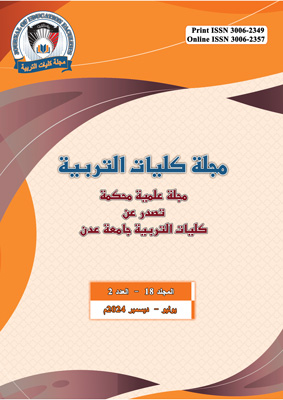The Relative Contribution of Academic Procrastination and Anxiety Trait in Predicting Achievement Motivation Among Students of the Faculty of Arts - University of Aden
DOI:
https://doi.org/10.47372/jef.(2024)18.2.140Keywords:
Academic Procrastination, Anxiety, Academic Difficulties, Trait Achievement Motivation, Students of the Faculty of Arts - University of Aden.Abstract
The aim of this research was to identify the prevalence levels of academic procrastination, anxiety trait and achievement motivation among students of the Faculty of Arts\ University of Aden. It also sought to examine the contribution of academic procrastination and anxiety trait in predicting achievement motivation and the differences in academic procrastination based on gender. The study was conducted on a sample of 203 students (79 males and 124 females) from the Faculty of Arts\University of Aden, including both theoretical and practical departments. Their ages ranged between 18 and 25 years, with an average age of 20.34 years and a standard deviation of 1.43. Based on gender, the sample included 79 males and 124 females. According to academic year variable, the sample consisted of 41 first-year students, 46 second-year students, 53 third-year students and 63 fourth-year students. Regarding the type of study (theoretical vs. practical), the sample included 113 students from theoretical sections and 90 students from practical sections. Three scales were applied which they are: the Academic Procrastination Scale (Abu Izriq & Jaradat, 2013), the Anxiety Trait Scale (Abdul Raqib Al-Buhairi, 2005) and the Achievement Motivation Scale (Abdul Maqsoud, B.T.). The results indicated that academic procrastination among students of the Faculty of Arts\ University of Aden was at a moderate level. Conversely, they exhibited high levels of both anxiety trait and achievement motivation. A statistically significant positive correlation (p < 0.001) was found between academic procrastination and anxiety trait, whereas a statistically significant negative correlation (p < 0.001) was observed between academic procrastination and achievement motivation. Additionally, the findings revealed that academic procrastination contributed with a percentage of 34.0% followed by anxiety trait with a percentage of 3.8% to predicting achievement motivation among students of the Faculty of Arts \ University of Aden. Furthermore, no statistically significant gender differences were observed in academic procrastination levels. However, students in practical departments exhibited significantly higher levels of academic procrastination compared to their peers in theoretical departments.
Published
Versions
- 24-07-2025 (2)
- 24-07-2025 (1)
How to Cite
Issue
Section
License
Copyright (c) 2025 Journal of the Faculties of Education - University of Aden

This work is licensed under a Creative Commons Attribution-NonCommercial 4.0 International License.

